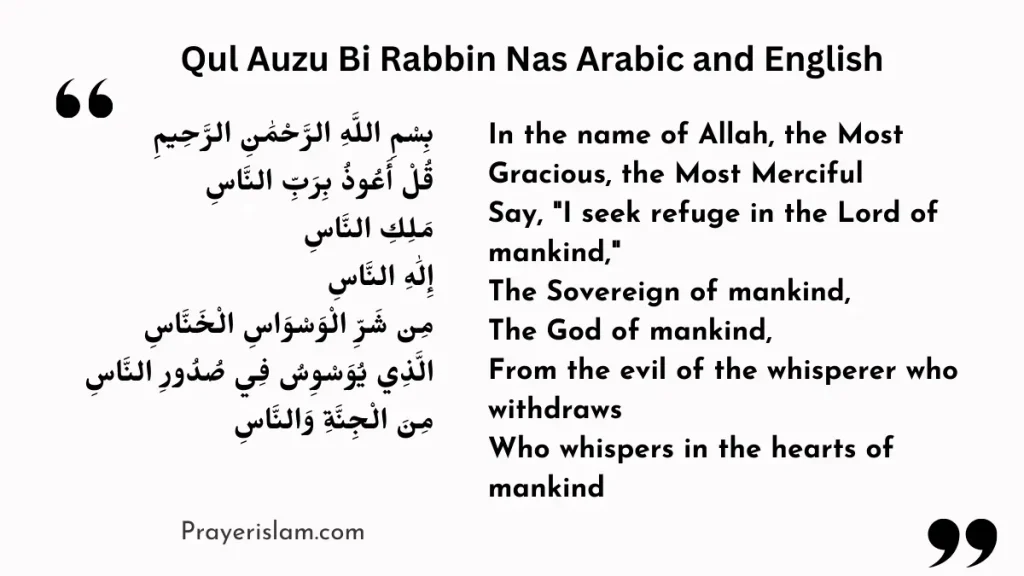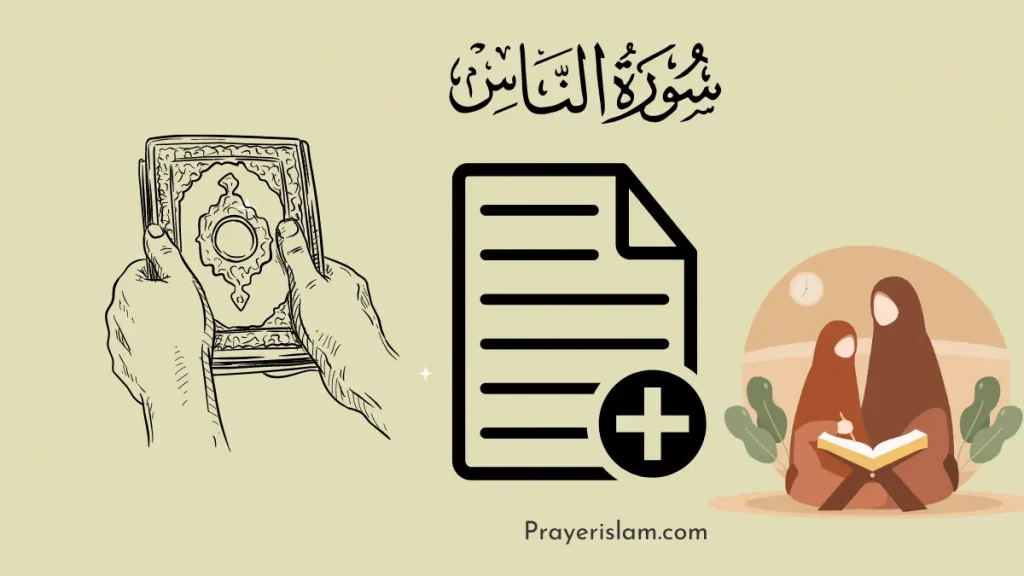In the vast ocean of Islamic teachings, certain verses hold a special place in the hearts of believers due to their profound significance and protective benefits. One such powerful chapter is Surah An-Nas, also known by its opening phrase, “Qul Auzu Bi Rabbin Nas.” This surah, found at the end of the Holy Quran, is a source of comfort and protection for Muslims around the world. This blog post aims to delve deep into the meaning, importance, and benefits of Surah An-Nas, shedding light on why it is recited so frequently in daily prayers and supplications.
Qul auzu bi rabbin Nas in Arabic and English
To truly appreciate the depth of Surah An-Nas, it is essential to first look at the original Arabic text along with its English translation:
بِسْمِ اللَّهِ الرَّحْمَٰنِ الرَّحِيمِ
In the name of Allah, the Most Gracious, the Most Merciful
قُلْ أَعُوذُ بِرَبِّ النَّاسِ
Say, “I seek refuge in the Lord of mankind,”
مَلِكِ النَّاسِ
The Sovereign of mankind,
إِلَٰهِ النَّاسِ
The God of mankind,
مِن شَرِّ الْوَسْوَاسِ الْخَنَّاسِ
From the evil of the whisperer who withdraws,
الَّذِي يُوَسْوِسُ فِي صُدُورِ النَّاسِ
Who whispers in the hearts of mankind,
مِنَ الْجِنَّةِ وَالنَّاسِ
Among jinn and among mankind.

Qul Auzu bi rabbin Nas translation
Surah An-Nas, the 114th chapter of the Quran, is composed of six short yet profound verses. Here is a translation and explanation of each verse:
In the name of Allah, the Most Gracious, the Most Merciful
1. Say, “I seek refuge in the Lord of mankind,”
In this verse, believers are instructed to seek protection from Allah, who is the Creator and Sustainer of all humans.
2. “The Sovereign of mankind,”
Allah is described as the ultimate ruler and king, emphasizing His authority over all creation.
3. “The God of mankind,”
This verse reaffirms that Allah is the only deity worthy of worship, solidifying His uniqueness and supremacy.
4. “From the evil of the whisperer who withdraws,”
Believers seek refuge from the evil whisperings of Satan, who plants doubts and evil thoughts in the hearts of humans.
5. “Who whispers in the hearts of mankind,”
Satan’s whispers can affect anyone, infiltrating their thoughts and intentions.
6. “Among jinn and among mankind.”
The final verse acknowledges that these whispers can come from both jinn and humans, highlighting the need for constant vigilance and divine protection.
Word Analysis
To gain a deeper understanding of Surah An-Nas, let’s analyze some key words:
- قُلْ (Qul): This imperative verb means “Say.” It indicates that the reciter is being commanded to speak the words that follow.
- أَعُوذُ (Auzu): This verb means “I seek refuge” or “I take refuge.” It signifies seeking protection and safety.
- رَبِّ (Rabbi): This noun means “Lord” or “Sustainer.” It refers to Allah’s role as the Creator and caretaker of all beings.
- النَّاسِ (Nas): This word means “mankind” or “people.” It encompasses all human beings.
- مَلِكِ (Malik): This noun means “King” or “Sovereign,” emphasizing Allah’s authority and dominion.
- إِلَٰهِ (Ilah): This noun means “God” or “Deity,” affirming Allah’s singular divinity.
- شَرِّ (Shar): This noun means “evil” or “harm,” representing the negative forces believers seek protection from.
- وَسْوَاسِ (Waswas): This noun means “whisperer,” referring to the insidious whispers of Satan.
- خَنَّاسِ (Khannas): This adjective means “one who withdraws,” describing how Satan retreats when Allah’s name is invoked.
References to Quran and Hadith
Surah An-Nas is part of the “Al-Mu’awwidhat,” a pair of chapters (along with Surah Al-Falaq) that provide protection. These surahs are frequently recited for their powerful protective qualities.
References in the Quran:
- Surah Al-Falaq (Chapter 113) is often recited together with Surah An-Nas for comprehensive protection from evil.
- The Quran emphasizes the importance of seeking Allah’s protection in various verses, such as in Surah Al-Baqarah (2:286), where believers seek refuge in Allah from the evil of what they have earned.
References in Hadith:
- The Prophet Muhammad (peace be upon him) recommended the recitation of Surah Al-Falaq and Surah An-Nas thrice in the morning and evening as a means of protection (Sahih Bukhari).
- In another hadith, the Prophet (peace be upon him) advised reciting these surahs before sleeping to seek protection from all forms of harm (Sahih Muslim).
Benefits of Surah Qul Auzu Bi Rabbin Nas
Surah An-Nas offers numerous spiritual and practical benefits:
Protection from Evil: Reciting this surah shields believers from the harmful effects of Satan’s whispers and other forms of evil, both seen and unseen.
Spiritual Cleansing: The surah helps purify the heart and mind by warding off negative thoughts and influences.
Mental Peace: By seeking refuge in Allah, believers find solace and peace of mind, knowing they are under divine protection.
Strengthening Faith: Regular recitation reinforces a believer’s faith in Allah’s power and sovereignty, fostering a closer relationship with the Creator.
Daily Protection: Integrating this surah into daily routines, such as morning and evening supplications, ensures continuous divine protection throughout the day.
When to Read Qul Auzu Bi Rabbin Nas?
Surah An-Nas can be recited at various times for different purposes:
Morning and Evening: Reciting this surah thrice in the morning and evening, along with Surah Al-Falaq, provides protection throughout the day and night.
Before Sleeping: The Prophet Muhammad (peace be upon him) recommended reciting Surah An-Nas before sleeping to ensure safety from nightmares and other harms.
During Illness: Reciting this surah over someone who is ill or in pain can help provide spiritual healing and comfort.
In Times of Fear: Whenever feeling anxious, scared, or in doubt, reciting Surah An-Nas can bring immediate relief and a sense of security.
Summary
Surah An-Nas, known for its opening words “Qul Auzu Bi Rabbin Nas,” is a powerful chapter in the Quran that provides protection from all forms of evil. Its verses highlight Allah’s supreme authority and His role as the protector of mankind.
By understanding the meaning and significance of this surah, believers can fully appreciate its protective qualities. Regular recitation of Surah An-Nas not only shields from harm but also strengthens faith and brings mental peace. Integrating this surah into daily practices ensures continuous divine protection, making it an essential part of a Muslim’s spiritual routine.
Frequently Asked Questions
Q1: What is the main purpose of Surah An-Nas?
A1: The main purpose of Surah An-Nas is to seek Allah’s protection from the evil whispers of Satan and other harmful influences.
Q2: How often should Surah An-Nas be recited?
A2: It is recommended to recite Surah An-Nas thrice in the morning and evening, and before sleeping. It can also be recited whenever one feels the need for protection or is in distress.
Q3: Can Surah An-Nas be recited for someone who is ill?
A3: Yes, reciting Surah An-Nas over someone who is ill can provide spiritual healing and comfort, as it invokes Allah’s protection and mercy.
Q4: Is there any special significance in reciting Surah An-Nas with Surah Al-Falaq?
A4: Yes, reciting Surah An-Nas along with Surah Al-Falaq, known as the “Al-Mu’awwidhat,” offers comprehensive protection from all forms of evil, both seen and unseen.
Q5: What does the word “Waswas” mean in Surah An-Nas?
A5: “Waswas” refers to the insidious whispers of Satan, who tries to plant doubts and evil thoughts in the hearts of humans.







